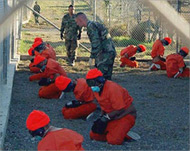UN: Arab rulers misusing 9/11
The United Nations has charged Arab regimes with taking advantage of the US-led “war on terrorism” to adopt extreme security measures eroding civil and political freedoms.

Restrictions adopted in the United States and other Western countries in the wake of the 11 September 2001 attacks had also hit Arabs particularly hard, said the world body’s latest Arab Human Development Report, released on Monday.
“Extreme security measures” adopted in response to the attacks had “exceeded their original goals and led to the erosion of civil and political liberties in many countries in the world, notably the United States”, said the report released by UN Development Programme regional director, Rima Khalaf Hunaidi.
Such restrictions had often ended up “diminishing the welfare of Arabs and Muslims living, studying or travelling abroad, interrupting cultural exchanges between the Arab world and the West and cutting off knowledge acquisition opportunities for young Arabs.”
The report cited data from a “number of Arab missions” indicating that Arab student numbers in the United States had dropped by an average of 30% between 1999 and 2002.
Arab rights eroded
Inside the Arab world the impact of such “freedom-constraining measures in developed countries” had been even more damaging as they “gave authorities in some Arab countries another excuse to enact new laws limiting civil and political freedoms”.
|
“Governments have mixed the war on terrorism with their own political ends” Alaa Shalaby, |
“The Arab countries as a group adopted an expanded definition of terrorism, which assumed institutional expression at the regional level in ‘The Arab Charter against Terrorism'”, the report said.
The report recapitulated criticism of the charter by human rights watchdogs.
“It allows censorship, restricts access to the Internet, and restricts printing and publication,” the report said.
“Moreover, the Charter neither explicitly prohibits detention or torture, nor provides for questioning the legality of detentions.
“Furthermore, it does not protect personal freedom, since it does not require a prior judicial order authorising the wire-tapping of individuals or groups,” it said.
NGO agrees
The Cairo-based Arab Organisation for Human Rights (AOHR) welcomed the report’s criticisms, saying that it has long made the same claims.
“These problems existed before, but after 9/11 Arab governments used the “war on terror” as an excuse to crack down on human rights,” said AOHR spokesman, Alaa Shalaby.
“Governments have mixed the war on terrorism with their own political ends,” he said.
“We have seen new laws for combating terrorism used to violate human rights. Civilians have been put in front of military courts and special state-run security courts in Egypt, Syria, Jordan, Sudan and Libya,” he added.
|
“We need some time for this to change. It is a question of attitude not law. Democracy is not just laws it is a way of living, a way of thinking” Usama Malkawi, |
“Arab countries have selected the parts they like from the UN’s International Terrorism Conventions. New laws (from 1999) combating money laundering have been used against independent organisations, political parties and charities.”
Shalaby agreed with the report that the Arab nations were taking their lead from Western countries who are failing to practise the human rights they preach.
“We are not just condemning violations in the Arab world. Israel, the US and the UK have also used 9/11 to crack down on their own people.
“The ‘model countries’ for human rights are setting a bad example. Using military courts, arresting opposition, and throwing out refugees. They are doing it under US pressure.”
The most notorious example is the US military’s concentration camp in Guantanamo Bay, where “terrorism” suspects have been held without trial for over two years.
Israel also blamed
The UN report also took issue with Israel, hitting out at the “horrifying human casualties and material destruction” that had resulted from its military operations in the Palestinian territories.
“From September 2000 to April 2003, Israeli occupation forces killed 2,405 Palestinian citizens and injured 41,000 others,” it said.
“Most of those killed (85%) were civilians. A large proportion (20%) of them were children.
“UNICEF (the UN children’s fund) estimates that 7000 children were injured and that 2500 persons, of whom 500 were children, suffered permanent handicaps,” it added.
Nothing new
Usama Malkawi, an outspoken former Jordanian MP and lawyer, said that the problems could not be blamed on US policy since 11 September 2001, but were illustrative of a region in the throes of change.
“In Jordan and other countries in the Middle East, democracy is not in a good shape, but this is nothing new,” he said.
“Over the past two or three years there have been new laws to open up government information to the people. Historically, Arab governments have given out little information. We need some time for this to change. It is a question of attitude not law. Democracy is not just laws, it is a way of living, a way of thinking,” he said.
 |
|
Setting a bad example: Guantanamo is beyond the law |
He added that the Arab Charter against Terrorism and other such conventions only justified in new ways what governments had been doing already, but stressed that the conditions for better human rights were slowly emerging in the region.
“Some politicians believe that these charters are against human rights, but at least in Jordan we have the freedom to express that through the media,” he said.
Iraq challenge
The UN report described the US-led occupation of Iraq as a “challenge” for the region as whole.
“The only way to meet that challenge is to enable the Iraqi people to exercise their basic rights in accordance with international law, free themselves from occupation… and take charge of rebuilding their country,” it said.
Before his death in a truck bombing at the United Nation’s Baghdad headquarters in August, UN envoy Sergio Vieira de Mello had been an outspoken critic of the slow pace of the occupation coalition’s moves to return power to Iraqis.